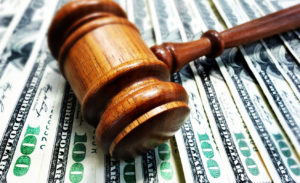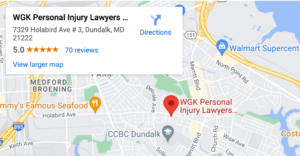
Damages refer to the compensation a person receives when another person breaches a duty or violates some type of right. Because the court cannot undo the consequences of an accident or the pain and suffering caused by an injury, the only remedy it can offer a victim is monetary compensation.
The at-fault party is financially liable for the victim’s damages.
In a personal injury case, damages can include:
The amount of compensation for damages a victim could receive depends on the circumstances and facts of the case.
Table of Contents
What are Economic Damages?

Economic damages include the expenses and financial losses associated with an accident and injury. For example, in a car accident case, economic damages could include property damage claims, medical bills, and loss of income.
It could also include therapy bills, medications, and medical equipment.
Any reasonable financial loss or expense related to the injury case can be included in economic damages. For instance, if you sustain a permanent disability in a motorcycle accident, you might need to modify your home to accommodate your disability. The cost of the modifications to your home could be included in economic damages.
A decrease in future earning potential could be an economic damage. If a permanent impairment caused by an accident restricts your ability to work, you could incur a future loss of income. Future loss of income is an economic damage in a personal injury case.
What are Non-Economic Damages?
When you are injured in a pedestrian accident, slip and fall accident, or because of a defective product, you sustain a physical injury. Those physical injuries are considered non-economic damages.
You may also suffer from mental anguish and emotional distress because of the accident and your injury. Those damages are also included in non-economic damages.
Non-economic damages are the “pain and suffering” a person endures after an accident.
It includes physical pain and emotional injuries, such as depression, anxiety, PTSD, and other psychological disorders.
Pain and suffering damages also include scarring, disfigurement, impairments, and disabilities. You might also receive compensation for the loss of quality of life or loss of enjoyment of life caused by your injuries from the accident.
What are Punitive Damages?
Punitive damages are rarely included in a personal injury case. This type of damage is used to “punish” a defendant in specific types of cases. The personal injury case must involve gross negligence or a willful disregard for the safety of another person.
A DUI accident is an example of a case that might include punitive damages. The driver got behind the wheel of a car while impaired by alcohol without concern for the safety of others on the road.
How Much are My Damages Worth?
Calculating damages in a personal injury case can be challenging. Placing a value on a person’s pain and suffering is subjective because each person and case is unique. A personal injury attorney analyzes each factor in the case to determine how that factor impacts the value of damages.
Factors that can impact the value of damages in a personal injury case include:
- The severity of the victim’s injuries
- Whether the person sustained a permanent impairment because of the accident
- The duration of the person’s recovery from injuries
- The amount of the financial damages incurred by the victim
- Whether there is a dispute regarding fault for the accident
- Whether the victim contributed to the cause of the victim’s injury
- The defendants involved in the case
Catastrophic injuries and permanent impairments increase the value of personal injury damages. Also, the duration of your recovery and the total of financial damages increase how much your personal injury claim might be worth. However, disputes regarding liability can significantly decrease how much money you receive for a personal injury claim.
In most states, if a victim is partially at fault for the cause of an accident, the victim’s compensation is reduced by the percentage of fault assigned to the victim. Maryland is one of the four states and the District of Columbia that has the harshest contributory negligence laws.
Under Maryland’s pure contributory negligence standard, a victim who contributes to the cause of an accident or their injury is barred from recovering any compensation for damages. In other words, if you can be blamed for the cause of your injury in any way, you receive no money for your personal injury claim.
Calculating Damages for a Personal Injury Claim
Calculating economic damages is generally easier than calculating pain and suffering damages.
Economic damages require proof of the expense or financial loss. Medical expenses can be proven using bills, invoices, and receipts. However, you must also have the medical records that prove the medical expenses were necessary and reasonable.
Likewise, you can use tax returns, pay stubs, and statements from your employer to prove lost income. However, your medical records must support the fact that you could not work because of your injuries.
Pain and suffering damages are more difficult to value. There is not a bill or statement to prove non-economic damages. Therefore, the facts of the case and your testimony are used to value pain and suffering damages.
Multipliers are commonly used to calculate pain and suffering damages. A multiplier is assigned to the claim based on the severity of the injury and other factors. You multiple the financial damages by the multiplier to calculate the value of non-economic damages.
Creating a pain and suffering journal can help establish the extent of your damages.
Logging daily pain levels, tasks you cannot complete, your mental state, and other information about your recovery helps your attorney formulate a narrative that describes the extent of suffering caused by the accident.
Get Help to Protect Your Right to Fair Compensation for Damages
An insurance adjuster’s job is to protect the company from liability for your injury claim. If possible, the adjuster denies the claim. When liability is not in disputes, the adjuster tries to find ways to lower the value of your damages.
Working with a personal injury lawyer is one of the best ways to maximize the value of damages in a personal injury case. Your lawyer understands how damages are calculated. He understands how to use the evidence and expert testimony to increase the value of damages.
Contact our Baltimore office to schedule a free consultation, you can give us a call at (410) 837-2144 to speak with an experienced personal injury lawyer at WGK Personal Injury Lawyers.


